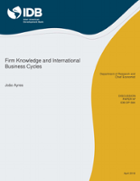Firm Knowledge and International Business Cycles
Date
Apr 2018
This paper quantifies the flow of knowledge within U.S. multinational corporations in the United States and European Union. A general equilibrium model of knowledge flows within multinationals is used to compute the parameter values related to knowledge production such that, in steady state, the model matches the observed factor share differentials between the operations of U.S. multinationals in the United States and European Union. The main assumptions are i) U.S. multinationals produce knowledge in the United States, ii) this knowledge is used by its subsidiaries in the European Union and iii) investment in knowledge is either unobserved or expensed in corporate accounts. The results show that the calibrated model matches the observed differentials in the rates of return of U.S. multinational investments in the U.S. and in the European Union, and investment in knowledge is 1.4 times larger than investment in physical capital. Furthermore, it is shown that the model calibrated with these parameter values has quantitative implications for international real business cycles. Accounting for the corporate sector GDP correlation, the model with knowledge flows reduces the distance between the standard international real business cycle model and data by 48 percent.




